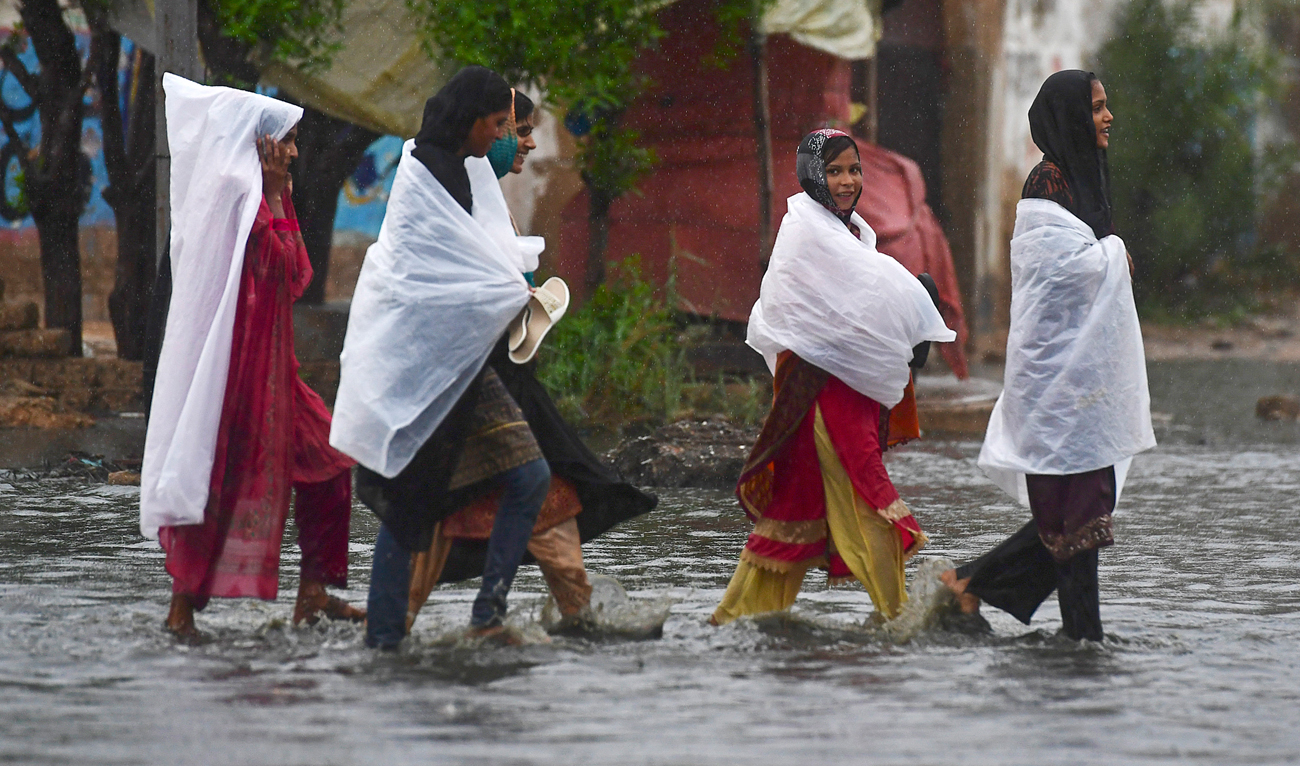KARACHI: Nine people have died in Karachi as monsoon rains lashed the port city for 24 hours going and the government announced a public holiday on Monday in Karachi and Hyderabad divisions.
According to data compiled by the National Disaster Management Authority (NDMA), nine deaths in Karachi brought the overall death toll from rains in the country to 321 since mid-June when the monsoon season began.
A Pakistan Meteorological Department (PMD) report said Karachi had received up to 217 millimeters of rain by 11am on Monday, while PMD director Sardar Sarfaraz told Arab News that the country’s southern region would receive more rain until Monday evening.
Karachi Police Surgeon Dr. Summaiya Syed said at least four people had died in the city due to electrocution during the last 24 hours.
“Two of them were brought dead to hospitals today,” she told Arab News.
Two persons, a thirty-five-year old Rahman Usman and ten years old girl Hafeeza, also died of electrocution in the Bihar colony area of the city, a spokesperson of the Edhi rescue said, adding that in three separate incidents, a 17 year old boy Atta-ur-Rehman, 23 years old Amir Khan and six-year-old boy Ahmed Ali drowned in rainwater drains in different parts of the city.
Imran Rana, a spokesperson for Karachi’s sole power distributor, K-Electric, urged citizens to remain cautious while using electrical appliances and maintain a safe distance from billboards and lamp posts.
Videos shared online showed several roads and thoroughfares flooded with rain water, and entering people’s residences in different neighborhoods of the city.
A breach in Hub Canal flooded Surjani Town and Manghopir localities of Karachi.
The nonstop rain also flooded I.I. Chundrigar Road, known as the Wall Street of Pakistan.
Murtaza Wahab, a spokesperson for the Sindh government, said the city’s drainage system was working well, though rain was “out of control.”
In Hyderabad, rains continued intermittently and inundated several houses and markets.
Around 30 houses were also partially damaged in Pakistan’s northwestern Khyber Pakhtunkhwa province due to torrential rains in the last 48 hours, while 15 were completely destroyed in floods, according to the Provincial Disaster Management Authority (PDMA).

Women wade through a flooded street during a monsoon rainfall in Karachi on July 24, 2022. (AFP)
The Met Office also warned of bad weather in the southwestern Balochistan province, where a woman died in heavy flooding in the Dera Bugti area on Saturday.
In Balochistan, videos shared on social media showed Lasbela city flooded with rain water.
Iftikhar Bugti, Deputy Commissioner Lasbela, said heavy flash floods were approaching adjacent areas of Hub Dam after relentless downpours in the district.
The southwestern province has suffered the highest death toll in recent rains, with Naseer Ahmed Nasar, PDMA director general, confirming the loss of 102 lives since the beginning of the monsoon season last month.
He said thousands of houses were damaged in Balochistan in the last few weeks, while people had also lost livestock in substantial numbers.
“The rains have killed 102 people while injuring 57 others,” Nasar told Arab News. “It has also damaged over 6,000 houses and affected 640 kilometers of roads in the province.”
Farah Azeem Shah, a spokesperson for the Balochistan government, said more than Rs92.4 million rupees ($402,000) had been released for those who had lost family members in recent torrential rains in the province.
She said the downpours had also damaged five dams and 11 bridges in Balochistan.
















